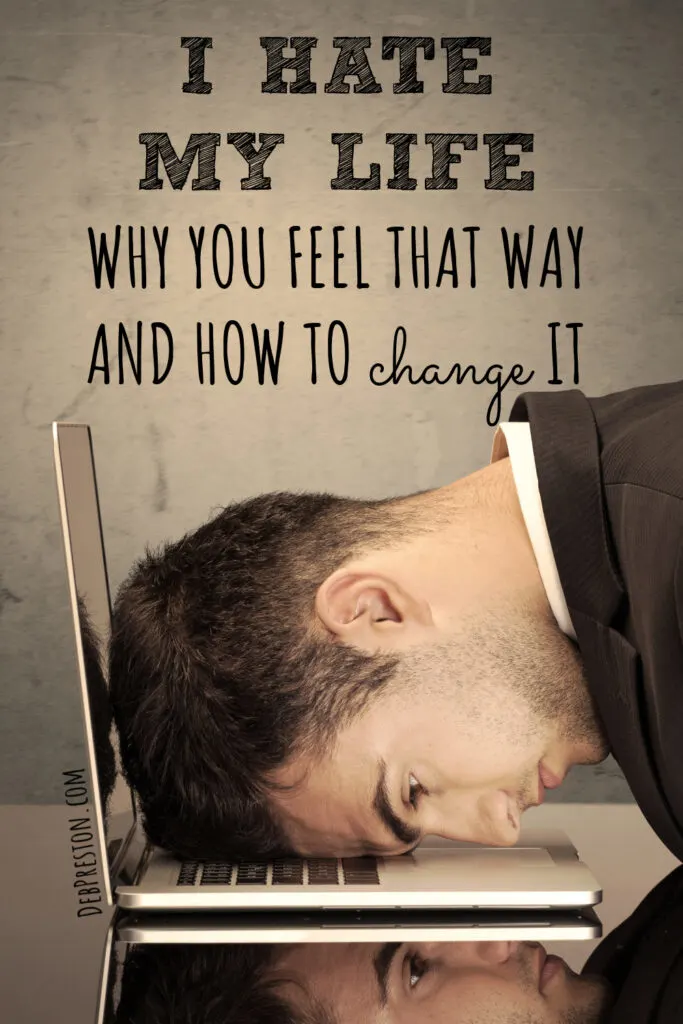“I hate my life!” Does that statement resonate with you?
Can I tell you a secret, friend? You are so far from alone. Millions of people feel that way every day and tens of thousands Google those exact words every month.
So…is life hopeless? Is your life beyond repair? Definitely not!
But overcoming that “I hate my life” thought and crafting a life that you don’t hate requires a few steps. The first is to understand why you hate your life and the second is to take proactive steps toward improving your circumstances.
Let’s talk about how to do both!
Understanding the Feeling
The first step to tackling this feeling is to identify why you feel this way. You can’t fight an enemy if you don’t know who they are, right?
In this step, you’ll not only want to clarify your feelings but also nail down your personal causes and triggers.
Defining “I Hate My Life”
When you say “I hate my life,” you’re expressing a deep dissatisfaction with your current situation and circumstances.
This feeling can be both overwhelming and concerning but it’s essential to recognize that it’s a valid emotion. Experiencing negative thoughts and emotions is a common part of the human experience, and recognizing them is the first step toward addressing the root causes.
Triggers and Causes
Identifying the triggers and causes of your “I hate my life” feelings can help you better understand and address them. People’s circumstances and emotions vary, so the underlying reasons for these thoughts will be different for everyone.
Some common triggers can include:
- Unsuccessful or unfulfilling personal relationships
- Dissatisfaction with work or career – I hate my job!
- Financial stress or difficulties
- Feeling overwhelmed by external pressures and expectations
- Experiencing negative effects from past trauma
In many cases, there could be a pattern to these feelings, with specific situations leading to recurring negative thoughts. Understanding your triggers is crucial for taking steps to address these negative emotions and improve your life.
Start by reflecting on your current situation and identifying which aspects of your life are causing you distress. Once you’ve pinpointed these triggers, you can begin working toward finding solutions and developing healthy coping strategies.
Remember, it’s essential to approach this process with a kind and compassionate attitude toward yourself. Acknowledge that it’s okay to feel this way and that it’s a normal part of the human experience.

Understanding the Impact on Personal Life
It’s not only important to understand the reason behind your “I hate my life” feeling but also its impact on your personal life. While you might feel as if this mentality is just affecting you, it’s likely affecting your relationships, your work and school performance, and more!
Again, the first step in tackling the way you’re feeling is to understand all of the moving pieces. Recognizing the impact on your personal life can not only help you more effectively approach the issue but can also boost your motivation to do so.
Effect on Relationships
When you feel like you hate your life, it can have a significant impact on your personal relationships. This includes connections with family members, friends, and romantic partners.
You might find yourself withdrawing from social interactions, which can lead to a feeling of isolation and loneliness. At the same time, when you do engage with others, you may experience conflict or tension, as unresolved negative feelings can affect your communication and overall demeanor.
It’s essential to recognize these emotions and address them to prevent further damage to your relationships.
Performance in Work or School
Similarly, the feeling of hating your life can carry over into your performance at work or school.
When you’re preoccupied with negative thoughts, it’s challenging to focus on your tasks and responsibilities. With a lack of motivation and a pessimistic mindset, your productivity and engagement may decrease.
This decline in performance can have additional consequences on your life, such as losing your job or failing in your studies. It’s essential to identify your pain points and focus on what you can control to improve your work or school situation proactively.
Understanding the Impact on Physical and Mental Health
Unfortunately, the impact of hating your life doesn’t end with your relationships and work performance.
Physical Health Challenges
Constantly harboring negative thoughts can harm your physical health as well. Prolonged stress can lead to an increase in blood pressure, cortisol levels, and heart rate which, in turn, can contribute to feelings of anxiety, irritability, and even sadness or anger.
Sleep deprivation, a common side effect of poor mental health, can further exacerbate these issues. Ensuring that you get proper rest and implementing healthy habits can go a long way in improving your overall health.
Depression and Anxiety
When you’re constantly thinking “I hate my life,” it could actually be a sign of an underlying mental health issue like depression or anxiety!
It’s important to remember that your feelings are valid, but seeking help from a mental health professional can provide valuable support and treatment options. For example, talking to a therapist or a healthcare professional can help identify your pain points and create a plan to address them.
Depression, also known as major depressive disorder, can manifest in various ways, such as changes in your appetite, difficulty concentrating, and even suicidal thoughts. Similarly, feelings of anxiety can worsen your mental health and impact your daily life.
When you’re struggling with such emotions, focusing on aspects you can control and taking proactive steps, like establishing healthy coping strategies or reaching out to a mental health professional, can make a significant difference in your well-being.
Don’t hesitate to reach out for help to make positive changes in your life. You deserve to feel your best.
Social and Cultural Factors
Now that you’ve identified the root cause of your “I hate my life” feelings and all of its repurcussions, let’s talk about how to turn the boat around! One of the biggest causes of this mentality is triggered by social factors (mostly) within your control.
Media Influence
In today’s world, you may often feel inundated with information and images from various media sources, including television, movies, and especially social media.
These platforms can significantly influence your perception of life and contribute to feelings of dissatisfaction. For example, constant exposure to idealized images on Instagram might make you feel inadequate about your looks, your financial situation, your relationships, or your career.
It’s important to recognize these influences and take time to reflect on whether they are negatively affecting your self-esteem and life satisfaction. Consider limiting your exposure to TV, social media, and other harmful media content or focusing on uplifting, positive material that supports your personal growth and well-being.
Societal Pressure
Society places a lot of importance on things like status and wealth. This can result in you feeling pressured to constantly strive for more – a better job, a fancier car, or a bigger house.
This endless pursuit can create a sense of dissatisfaction, making you feel like you “hate” your life. Not to mention the potential for facing racism and discrimination based on factors beyond your control, further adding to your feelings of frustration and weariness.
Be mindful of these societal factors and take a step back to focus on what truly matters to you. Focusing on your personal values, forming genuine connections, and prioritizing your well-being can help you feel more fulfilled and content, despite societal pressures.

Lifestyle and Habits
Now that you’ve tackled some obvious negative influences, let’s talk about how small, daily actions can build you up into a better place.
Self-Care Practices
A crucial aspect of improving your life is focusing on self-care practices.
Start by making sure you exercise regularly. Incorporate physical activities that you enjoy, like swimming or dancing, to help boost your mood and overall well-being.
Getting enough sleep is another important self-care practice. Ensure that you maintain a consistent sleep schedule, aiming for 7-9 hours of quality sleep each night to keep your physical and mental health in check.
Eating healthily also has a profound impact on your emotions and mental health. Prioritize consuming a balanced diet, rich in fruits, vegetables, whole grains, and lean proteins.
Practicing meditation and yoga can help you increase your self-awareness and improve your ability to handle stress more effectively.
Journaling can also offer some mind-blowing mental health benefits, whether you’re starting every day by writing your unfiltered thoughts or tracking your self care efforts.
Existing Unhealthy Habits
While adopting healthy habits, it’s also essential to identify and address any existing unhealthy habits in your life.
If you’re struggling with alcohol, drugs, or substance abuse, recognize that these habits can exacerbate your feelings of hate toward your life. Seek professional help or join support groups to deal with these issues in a healthy and sustainable manner.
Moreover, reflect on whether you’re neglecting any important aspects of your life. If so, take time to evaluate why this happens, and work on nurturing these neglected areas.
This might include repairing relationships, seeking mental health support, or addressing unresolved traumas. By recognizing and addressing unhealthy habits in your life, you can create an environment conducive to healing and growth.
Change and Acceptance
Perhaps the hardest steps of all, it’s important to learn how to accept your life for what it currently is and to make a plan to move forward from there. This is where some of the heaviest lifting comes into play, since it requires you revolutionize your mindset into one that serves you…rather than the other way around.
Accepting the Situation
It’s normal to feel frustrated or even overwhelmed when life doesn’t go as planned. The first step in overcoming these feelings is to accept the situation.
Realize that some aspects of your life are out of your control. Instead of dwelling on the negative aspects, try to shift your perspective and focus on the aspects that you can control.
Acceptance doesn’t mean giving up. Rather, it means acknowledging the reality of your situation and preparing to make the necessary changes for growth.
Making Necessary Changes
Once you’ve accepted the situation, it’s time to take action.
Define your vision and goals for a better life. Break them down into smaller, achievable steps to make the process more manageable. Remember to be patient and compassionate with yourself, as change can be difficult and may take time.
Take care of your physical and mental well-being. A healthy lifestyle can significantly improve your overall mood and happiness.
Make sure you’re eating well, exercising regularly, and getting enough sleep. Don’t hesitate to seek professional help if you feel overwhelmed by your emotions or if you suspect that you may be suffering from a mental health issue such as depression or anxiety.
Expand your social support network. Having positive relationships can provide a crucial support system as you face life’s challenges.
Consider joining clubs or groups that share your interests to meet new people and make friends. Don’t be afraid to reach out and ask for help when you need it.
Practice gratitude and mindfulness.
Being present in the moment and appreciating the good things in your life can help shift your mindset and perspective. Try practicing mindfulness techniques such as meditation, deep breathing, or journaling to de-stress and refocus on what truly matters in your life.
By embracing a combination of acceptance and change, you can take back control and work toward living a more fulfilling and happy life. Remember, you have the power to make a difference in your own life – one step at a time.

Seeking Professional Help
Therapy and Counseling
If you’re struggling with feelings of hating your life, it’s important to consider seeking professional help. A good starting point is to look into therapy and counseling services.
Therapists and counselors are trained to help you navigate your emotions, identify any underlying mental health conditions, and develop strategies for improving your well-being.
You can work with a therapist to explore the specific challenges you’re facing and gain insights into your thoughts and emotions. Mental health professionals can also help you identify any underlying issues, such as depression or anxiety, that may be contributing to your negative feelings.
Several types of therapy can be beneficial, such as cognitive-behavioral therapy (CBT), dialectical behavior therapy (DBT), or psychodynamic therapy. The best approach will depend on your individual situation and the therapist’s expertise.
Utilizing Support Groups
In addition to therapy, support groups can be a valuable resource for individuals who are struggling with their lives. These groups provide a safe and supportive space for you to share your experiences, learn from others who have faced similar challenges, and gain new perspectives.
There are support groups for various mental health conditions, as well as groups aimed at specific life situations, such as grief, divorce, or career transitions. Attending these meetings can help you build a connection with others who understand what you’re going through, allowing you to feel less isolated.
Additionally, consider exploring online forums or social media groups that focus on personal growth, mental health, or life coaching. Many people find value in sharing their journey and gaining inspiration from others in similar situations.
Remember, reaching out for help is a sign of strength, not weakness. By seeking professional assistance and connecting with others, you’ll be taking meaningful steps toward transforming your mindset and improving your life.
Finding Peace and Fulfillment Through Faith
If you’re vehemently against any type of faith or religion, feel free to scroll past this section. But for what it’s worth…my faith in Jesus has been a complete game-changer.
I’ll always remember moving back in with my parents after an ugly divorce and feeling the weight of the world on me from losing my marriage, losing my job, and moving across the country from everything I had spent years working to build. My family was a mess, I lost all my friends to my ex, and my health was in decline. There was literally no part of my life that I didn’t hate.
On one especially hard night, I decided to give it all to God. I figured, why not? I had nothing to “give” anyways and was desparate enough to give anything a shot.
And, friend? My life has never, ever been the same.
It didn’t immediately fix everything. It still took a lot of hard work and persistence.
But I now live with contentment, peace, and, best of all, purpose. I know who I am, why God has given me the personality and talents He has, and what I want and need to do with them.
Even on my hardest days, I hold a perspective that transcends my trials. This world and its problems no longer dictate my happiness.
If you’re in a similar place right now, I would challenge you…why not give it a shot? What have you got to lose?
If you want an understanding of what it means to be a Christian, without complex theology or “Christianese” speech, check out this video.

Whatever the root cause of your “I hate my life” feelings, and no matter what steps you take to squash those feelings and improve your life, I’m rooting for you.
You’re not the first person to feel this way and you won’t be the last. But I believe you have the strength, the perserverance, and the no-one-else-tells-me-how-my-story-goes mindset to fight back. And once you’re free from this hole and sincerely loving life, I pray you reach down into the hole to help someone else out of it.
You’ve got this.
Frequently Asked Questions
Why do I feel so miserable?
Feeling miserable can stem from various factors, such as untreated mental health issues like depression, anxiety, or trauma. It can also be a result of stress, relationship issues, or life dissatisfaction.
It’s essential to pinpoint the reasons behind your misery to address them effectively.
How can I cope with negative emotions?
Coping with negative emotions starts with acknowledging and accepting your feelings. Developing healthy coping mechanisms is essential, such as practicing self-care, journaling, seeking professional help, talking to someone you trust, and engaging in activities that you enjoy.
What can I do to improve my life?
To improve your life, it’s helpful to identify pain points and aspects you want to change.
Focus on the things within your control and create realistic goals to work toward. Consider seeking support from friends, family, or professionals to help you along the way.
What are some ways to develop a positive mindset?
Developing a positive mindset involves practicing gratitude, setting healthy boundaries, and surrounding yourself with positive influences. Engage in activities and hobbies that bring you joy and satisfaction, and don’t be afraid to seek help if you’re struggling to develop a positive outlook on your own.
How do I identify and change self-destructive habits?
Tune into your thoughts, actions, and emotions to identify self-destructive habits. Look for patterns that negatively impact your well-being, and consider seeking guidance from friends, family, or a professional therapist.
Work on implementing healthier alternatives, take small steps, and be patient with your progress.
Where can I find support when I’m feeling down?
Support can come in various forms, such as friends or family members, professional therapists, support groups, and online resources.
Reach out to those who understand your situation and can offer guidance, empathy, and encouragement during tough times. Remember, it’s okay to ask for help when you need it.

P.S. Ready to start living life on YOUR terms? The Take Charge Collection of 15 free resources will help you to simplify, organize, and take charge of your life! Get yours HERE.
Disclosure: While all opinions are our own, we are a participant in the Amazon Services LLC Associates Program and other affiliate advertising programs, designed to provide a means for us to earn fees by linking to Amazon.com and affiliated sites, at no additional cost to you.



